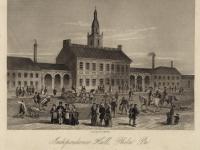The Historical Society of Pennsylvania with its area partners announce teacher institutes for the summer of 2015.
HSP's newest teacher institute, Cultures of Independence: Perspectives on Independence Hall and the Meaning of Freedom, will raise awareness of how Independence Hall has been involved in the ongoing process of creating a nation and civic life, not just in the magical moment of July 1776. During each day of a week-long institute, 36 teachers will be immersed in a process of discovering and developing strategies for teaching the ongoing history of the American Revolution. Dr. Charlene Mires, author of Independence Hall in American Memory, will be the scholar-in-residence.
The institute will be offered twice: June 21-26 and July 26-July 31. Application information and institute details will be forthcoming on this page. There will be no fee for this program, and all participants receive a $1,200 stipend to help defray expenses.
About Cultures of Independence
Independence Hall in Philadelphia is a place Americans think they know well. The eighteenth-century landmark appears in textbooks as the setting for the Declaration of Independence in 1776 and the Constitutional Convention in 1787. Today the centerpiece of Independence National Historical Park and a World Heritage Site, it has been safeguarded and preserved as a testament to the ideals in these founding documents. However, as a public building and living landmark for more than two centuries since the American Revolution, Independence Hall also has served as a focal point for celebrations, demonstrations, and the ongoing process of creating a nation and civic life.
The proposed workshop, Cultures of Independence, will raise awareness that these histories and others are embodied by a building known primarily as a landmark of the 18th century. Along with its undeniable importance in preserving the story of the American Revolution, Independence Hall – and landmarks in communities across the nation – may be viewed as an opportunity for understanding the role of historic places in building bridges among cultures of the nation. Along with the building and the cultural landscape, the partnering institutions in this workshop offer rich collections of documents, artifacts, and works of art that will immerse teachers in a process of discovering and developing strategies for teaching the ongoing history of the American Revolution.
Specifically, this workshop will provide eighty teachers direct access to these stories and experiences and, through them, reach hundreds of students. The impact of the workshop will extend further as the lessons these teachers develop are used by other teachers to supplement their textbooks not only in teaching “the founding moment” but also in exploring issues of abolition, slavery, immigration, and ethnicity throughout American history.
About the National Endowment for the Humanities
Created in 1965 as an independent federal agency, the National Endowment for the Humanities supports research and learning in history, literature, philosophy, and other areas of the humanities by funding selected, peer-reviewed proposals from around the nation. Additional information about the National Endowment for the Humanities and its grant programs is available at: www.neh.gov.
About HSP
The Historical Society of Pennsylvania is a provider of education and information for the people of Philadelphia and beyond. With over 21 million documents – including manuscripts, graphics, and ephemera – HSP serves more than 4,000 researchers who come through its doors annually and millions more around the globe who use its resources online at hsp.org. HSP offers extensive online resources including digital collections, curricular materials, and hosts educator workshops, public programs and lectures throughout the year. To offer this array of programming and services, HSP relies on both public and private funding. Learn more about how to support our mission of inspiring individuals to create a better future through historical understanding at hsp.org
For additional information, contact Vincent Fraley, Communications Manager at the Historical Society of Pennsylvania at (215) 732-6200 ext. 233. HSP is located 1300 Locust Street, Philadelphia, PA. For general information, call (215) 732-6200, or visit HSP’s website at hsp.org.





